Pyongyang University of Medical Sciences
2020/04/29

Backbone centre for Training Competent Medical Scientists and Technicians
Established on September 28, Juche 37(1948), Pyongyang University of Medical Sciences is a leading institution of the country engaged in training able medical scientists and technicians. It plays the role of the nation’s centre for medical academic studies, medical information.

The university is charged with the mission of training well-informed personnel for medical research and education in a far-sighted manner, and is basically engaged in training medical scientists and technicians who will be able to take responsibility for human life and provide a sure guarantee for the people’s health.
It aims for the target of putting the qualitative level of medical education, the system of training able medical personnel, scientific research and preventive and curative treatment on the world’s advanced level.
By making a close combination of the training of able personnel, scientific research and clinical practice, the university is rearing creative people who will shoulder the development of the country’s medical science and technology, developing intellectual products based on latest achievements of medical science and technology and applying them to clinical practice, and thus integrating education, research and preventive and curative treatment.
FACULTIES
Faculty of Basic Medicine

The Faculty of Basic Medicine comprises the departments of anatomy, histology, physiology, biochemistry, molecular biology, microbiology, immunology, pathophysiology, biophysics, pharmacology, medical genetics, medical information science and medical bionics; an applied microbiology laboratory, a pharmacological laboratory, a nanotechnology laboratory, and an electrophysiology laboratory.
Faculty of Clinical Medicine No.1

Faculty of Clinical Medicine No.1 consists of such departments as diagnostic internal medicine, respiratory internal medicine, circulatory internal medicine, digestive internal medicine, nephric internal medicine, nervous medicine, paediatrics, radiology, roentgenodiagnostic science, public health management science, psychiatry, diagnostic experimental science, appliance-used diagnostics, infectious disease studies, tuberculosis studies, haematology, and endocrinology & metabolism.
Faculty of Clinical Medicine No.2

Faculty of Clinical Medicine No.2 includes such departments as urological surgery, thoracic surgery, ventral surgery, neurosurgery, traumatic orthopedics, introduction to surgery, anaesthesia & anabiosis science, paediatric surgery, ophthalmology, otorhinolaryngology & head & neck surgery, recuperation medicine, pathology, obstetrics & gynecology, dermatology, oncology, and forensic medicine.
Faculty of Koryo Medicine
The Faculty of Koryo Medicine has departments of Koryo internal medicine Nos.1,2 and 3, tonic medicine, Koryo pharmacology, massotherapy, acupuncture & moxibustion, Koryo paediatrics, Koryo surgery, Koryo infectious disease studies, Koryo otorhinolaryngology & head & neck surgery, and Koryo obstetric and gynaecological science; a classical medicine laboratory, a kyongnak & acupuncture & moxibustion laboratory, a Koryo medicine laboratory, a Koryo drug laboratory, and a Koryo pharmaceutical practice shop.
Faculty of Hygienics
The Faculty of Hygienics consists of the departments of hygienics, labour hygienics, environmental hygienics, children’s hygienics, nutritional administration, parasitology, epidemiology and anti-epidemic studies, and laboratories of healthy environment, growth stimulation, parasitology, health food and public nutritional administration.
Faculty of Dentistry

The Faculty of Dentistry has departments of dental preservation, periodontology, children’s dentistry, inner jaw surgery, face-lifting surgery, dental correction, dental prosthesis and dental materials, along with a dental preservation laboratory, a dental implant laboratory and a dental health laboratory.
Faculty of Pharmacology
The Faculty of Pharmacology includes departments of Koryo medicinal materials, synthetic medicine chemistry, pharmaceutical chemistry, pharmacology, biomedicine chemistry, analytical chemistry, pharmaceutical management and clinical pharmacology, and a natural medicine laboratory, a filler development laboratory, a synthetic medicine laboratory, and a pharmaceutical practice room.
Faculty of Sports Medicine

The Faculty of Sports Medicine is made up of four departments including the basic sports medicine, sports nutrition and fatigue, sports theory and practice departments, and a sports medicine practice shop.
The Faculty of Education gives refreshing courses to teachers, researchers, doctors and pharmacists and normal education to newly appointed teachers of the university.
Faculty of Education

The Faculty of Education gives refreshing courses to teachers, researchers, doctors and pharmacists and normal education to newly appointed teachers of the university.
Faculty of Distance Education

The Faculty of Distance Education is in operation for training more and more people into able medical experts in accordance with the requirement that all the people be well-versed in science and technology.
It consists of a distance education control section, a distance education resources development section, and a distance education programming section. It provides five-year courses in the fields of clinical medicine, Koryo medicine, dentistry, hygeinics and pharmacology.
EDUCATION
Graduate School

The Graduate School gives fulltime, correspondence, special and extraordinary courses divided into basic medicine, internal medicine, surgery, Koryo medicine, and sports medicine.
Academy of Medical Research
The Academy of Medical Research is an educational course after the graduate course, which trains world-class medical scientists who will be able to play the leading and backbone role in the sector of medical science. It is charged with the mission of training well-informed personnel who can solve important academic problems arising in medical education and carry out world-level medical research projects, those who can hew out the frontier of their respective fields and new sectors of academic studies while carrying out priority tasks of both the nation and the international community. The researcher-training courses span from 3 to 5 years.
RESEARCH CENTRES

The university has the medical genetics institute, immunity institute and clinical institute.
MANUFACTURE OF MEDICAL SUPPLIES
Medical Science and Technology Company


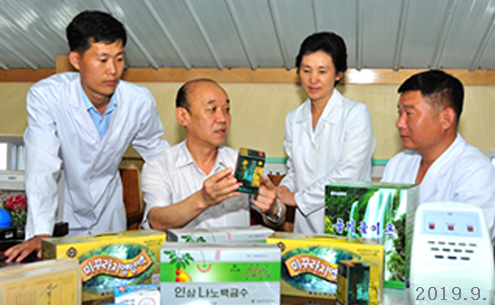
LIBRARY

The library offers comprehensive and up-to-date information about modern medical science and technology while playing the role of the hub of distance education and lectures on medical tendency and the venue of academic seminars to distribute achievements of medical science and technology.
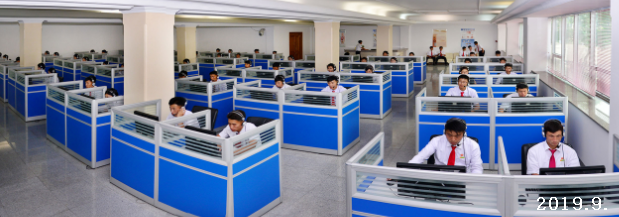



DORMITORY


The dormitory is equipped with study rooms, dining halls and a bathhouse in addition to bedrooms, which meet the students’ convenience.
Pyongyang University of Medical Sciences Hospital

The Pyongyang University of Medical Sciences Hospital is a general treatment base which was established by President Kim Il Sung immediately after liberation, and it is also a practice shop of the teachers and students of the university.
The hospital is an exclusive centre for training able doctors associated with the close care of
President Kim Il Sung and Chairman Kim Jong Il who paid primary attention to the training of health workers all the time. Relying on its relative independence it manages the operation and provides welfare and supply services. It is staffed with more than 1 000 excellent medical workers including those who have been honoured with the titles of People’s Doctor, Merited Doctor, Merited Pharmacist and Merited Nurse; equipped with latest facilities, the hospital consists of over 40 special departments, lots of beds for inpatients, telemedical service room, a dispensary department, a preparation department, and a pharmacy.
General Base for Medical Treatment and Training of Special Doctors

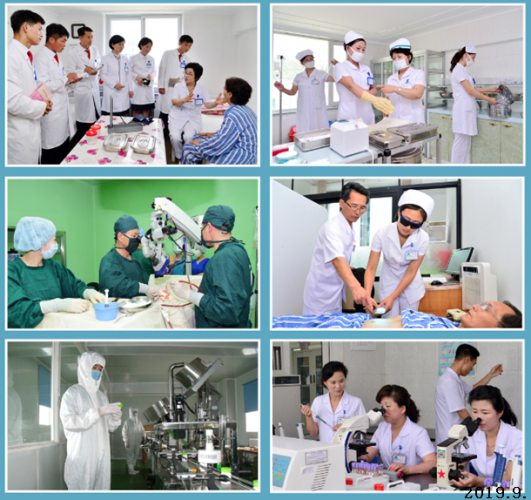
The hospital is a general treatment base which offers special medical services and a centre which trains students and graduates into able special doctors. There are 13 operation theatres, dozens of modern practice shops for clinical practice of the students, a clinical institute and a spine and pediatric behavorial and developmental disabilities institute where medical research is conducted.
Surgery

The surgical sector comprises a dozen special departments like ventral surgery, thoracic surgery, urological surgery, neurosurgery and tetradactylous orthopedics.
Internal Medicine

The internal medicine sector consists of a dozen special departments such as those of respiratory internal medicine, circulatory internal medicine, digestive internal medicine, nephric internal medicine and nervous internal medicine.
Koryo Medicine

The Koryo medicine sector is made up of the Koryo internal medicine, acupuncture and moxibustion, Koryo paediatrics, and manual therapy departments.
Paediatrics


The paediatrics sector consists of two paediatrics departments and an intensive care department.
Pharmaceutical Sector
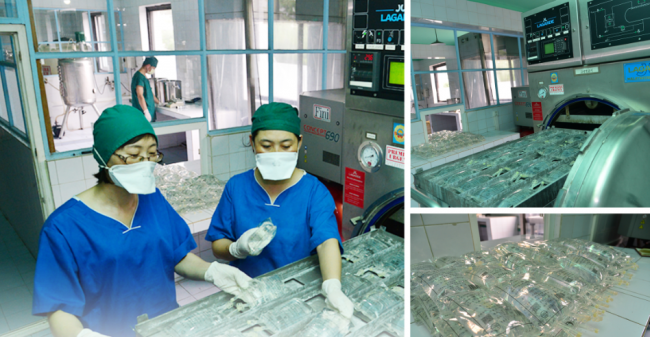
The hospital has a pharmaceutical manufacturer which produces and supplies chemical and traditional Korean medicines needed for treatment.
Diagnostic and Examination Facilities
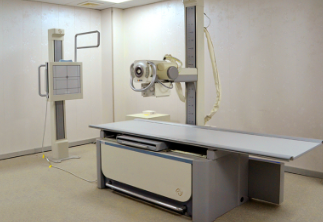


The hospital has diagnostic departments equipped with modern image-based diagnostic appliances and a general laboratory with all kinds of examination facilities.
Sterilization

Medical Oxygen Supply Centre

The hospital has a general sterilization station and an oxygen supply centre.
Telemedical Service
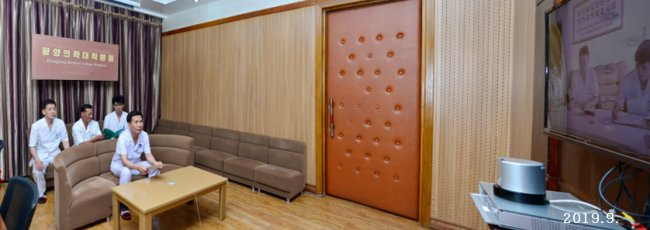
The hospital offers distance medical lectures and consultations to 12 provincial(municipal) people’s hospitals, 16 special hospitals of the provincial level, and all city and district (country) people’s hospitals.
SUPPLY SERVICE
The hospital provided with a good supply base for the diet of in-patients.
Jangmyong Latest Medicine Company

International Exchange
Academic exchange and cooperation activities



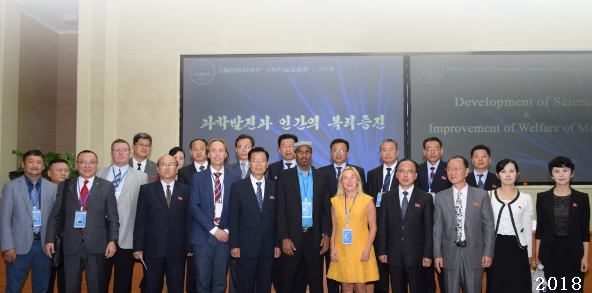




The university is engaged in diversified academic exchange and technical cooperation with medical professors and doctors of Russia, Germany, UK, Norway, Finland, the Philippines and other countries as well as overseas Korean medical scientists in extramural lectures, joint research, joint surgical operations and other realms. It has given education and practice to students from Cuba, Mongolia, Cambodia and Equatorial Guinea, and interns from Cuba, Mongolia, Syria, Pakistan, Indonesia and other countries. Excellent teachers, researchers and doctors engaging themselves in Koryo medicine are working in foreign countries in Europe, Asia, Africa and South America, giving extramural lectures and clinical services.
A lot of international organizations, NGOs and overseas Koreans visit the university and hospital for the purpose of cooperation.
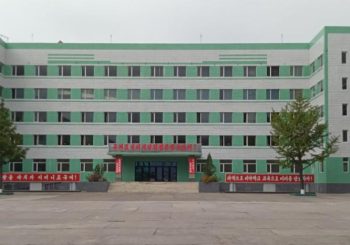 Chongjin College of Medical Sciences – Training Center of Talented Medical Scientists and Technicians in North Hamgyong Province
Chongjin College of Medical Sciences – Training Center of Talented Medical Scientists and Technicians in North Hamgyong Province
 Preparation to Be Revolutionary Cultivators of the Country’s Future
Preparation to Be Revolutionary Cultivators of the Country’s Future
 The Secondary School No.1 Envied by All
The Secondary School No.1 Envied by All
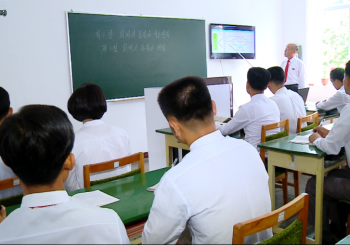 Affection Bestowed to College for Disabled Honored Soldiers
Affection Bestowed to College for Disabled Honored Soldiers
 Opening Ceremony of the Academy of Education –Scientific Research Center of Education Guaranteeing Development of the Country’s Education
Opening Ceremony of the Academy of Education –Scientific Research Center of Education Guaranteeing Development of the Country’s Education















































